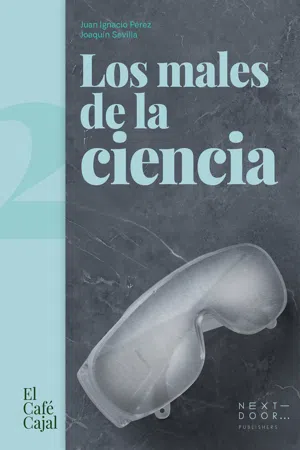![]()
Fuentes
En qué consiste la ciencia
AEI (Agencia Estatal de Investigación), http://www.aei.gob.es/.
BERNUY LÓPEZ, C., «La importancia de la inversión privada en I+D», elDiario.es (20/11/2020), https://www.eldiario.es/opinion/tribuna-abierta/importancia-inversion-privada-i-d_129_6439197.html.
BOWLER, P. y MORUS, I. R., Making Modern Science: A Historical Survey, University of Chicago Press, 2005.
BUSH, V., Science. The Endless Frontier, National Science Foundation, 1945, https://www.nsf.gov/about/history/vbush1945.htm.
CHALMERS, A. F., What Is This Thing Called Science?, University of Queensland Press, Open University Press, 3.rd revised edition, Hackett, 1999.
DAY, R. A., How to Write and Publish a Scientific Paper, Oryx, 4.ª ed., 1994.
DORA (Declaración de San Francisco sobre la Evaluación Científica), https://sfdora.org/.
Europa Press Data, https://www.epdata.es/datos/gasto-investigacion-innovacion-datos-graficos/224.
FECYT, https://www.fecyt.es/. Datos sobre ciencia en España en https://icono.fecyt.es/principales-indicadores.
FIRESTEIN, S., Failure: Why Science Is So Successful, Oxford University Press, 2015.
GARCÍA-GALLEGO, A., GEORGANTZIS, N., MARTÍN-MONTANER, J. y PÉREZAMARAL, T., «(How) Do research and administrative duties affect university professors’ teaching?», Applied Economics, vol. 47, 2015, pp. 4868-4883.
GODFREY-SMITH, P., Theory and Reality. An Introduction to the Philosophy of Science, University of Chicago Press, 2009.
KITCHER, P., Science, Truth, and Democracy, Oxford University Press, 2001.
NOWOTNY, H., The Cunning of Uncertainty, Polity Press, 2016.
ORESKES, N., Why Trust Science?, Princeton University Press, 2019.
PESTAÑA, A., «El sistema español de ciencia y técnica», Investigación y Ciencia, diciembre 1996.
ROACH, J., The Constitution of Knowledge: A Defense of Truth, Brookings Institution Press, 2021.
Unesco, https://es.unesco.org/. Datos sobre ciencia en el mundo en http://data.uis.unesco.org/.
Los valores y la ciencia
CHEVASSUS-AU-LOUIS, N., Fraud in the Lab-The High Stakes of Scientific Research, Harvard University Press, 2019.
ECHEVERRÍA, J., «El pluralismo axiológico de la ciencia», Isegoria, vol. 12, 1995, pp. 44-79.
ECHEVERRÍA, J., Ciencia y Valores, Ediciones Destino, 2002.
ECHEVERRÍA, J., «Los valores de las ciencias: Del ideal de neutralidad del siglo XIX a la supremacía actual de la innovación», Investigación y Ciencia, n.º 452, mayo 2014, pp. 2-3.
ECHEVERRÍA, J., «Valores y mundos digitales», en Els Valors: Passat i Futur, Andorra: Gobierno de Andorra, XXXV Universitat d’Estiu, 2018, pp. 62-94.
ELLIOT, K., «Rather than being free of values, good science is transparent about them», The Conversation (7/11/2020), https://theconversation.com/rather-than-being-free-of-values-good-science-is-transparent-about-them-84946.
FERRER, S., «Antiintelectualismo y COVID-19: ¿vuelve el culto a la ignorancia?», Sinc (24/7/2021), https://www.agenciasinc.es/Reportajes/Antiintelectualismo-y-covid-19-vuelve-el-culto-a-la-ignorancia.
FIRESTEIN, S., Failure: Why Science Is So Successful, Oxford University Press, 2015.
MACFARLANE, B. y CHENG, M., «Communism, Universalism and Disinterestedness: Re-examining Contemporary Support among Academics for Merton’s Scientific Norms», Journal of Academic Ethics, vol. 6, 2008, pp. 67-78.
MENÉNDEZ VISO, A., «Valores ¿ser o tener?», Argumentos de Razón Técnica, n.º 5, 2002, pp. 223-238.
MENÉNDEZ VISO, A., Las ciencias y el origen de los valores, Siglo XXI, 2005.
MERTON, R. K., «El estímulo puritano a la ciencia», La sociología de la ciencia, vol. 2, Alianza Editorial, 1977. (Es traducción de The Sociology of Science - Theoretical and Empirical Investigations, 1973, que republica «Motive Forces of the New Science» in Science, Technology and Society in Seventeenth-Century England, 1938, pp. 80-102, 104-110).
MERTON, R. K., «La ciencia y el orden social», La sociología de la ciencia, vol. 2, Alianza Editorial, 1977. (Es traducción de The Sociology of Science - Theoretical and Empirical Investigations, 1973, que republica «Science and the Social Order», Philosophy of Science, vol. 5, 1938, pp. 321-337).
MERTON, R. K., «La estructura normativa de la ciencia», La sociología de la ciencia, vol. 2, Alianza Editorial, 1977. (Es traducción de The Sociology of Science - Theoretical and Empirical Investigations, 1973, que republica «Science and Technology in a Democratic Order», Journal of Legal and Political Sociology, vol. 1, 1942, pp. 115-126).
NÚÑEZ CENTELLA, R., «La cultura científica», intervención en la Reunión de Presidentes de Comisiones de Ciencia e Innovación de los Parlamentos Nacionales de los Estados miembros de la Unión Europea y del Parlamento Europeo, 25 de marzo de 2010.
PUTNAM, H., The Collapse of the Fact/Value Dichotomy and Other Essays, Harvard University Press, 2002.
RAMÓN Y CAJAL, S., Reglas y consejos sobre investigación científica. Los tónicos de la voluntad, Espasa Calpe, Madrid, 1941. La edición original es de 1898.
RAUCH, J., The Constitution of Knowledge-A Defense of Thuth, Brookings Institution Press, 2021.
RITCHIE, S., Science Fictions. Exposing Fraud, Bias, Negligence and Hype in Science, The Bodley Head, 2020.
SAGAN, C., ...
